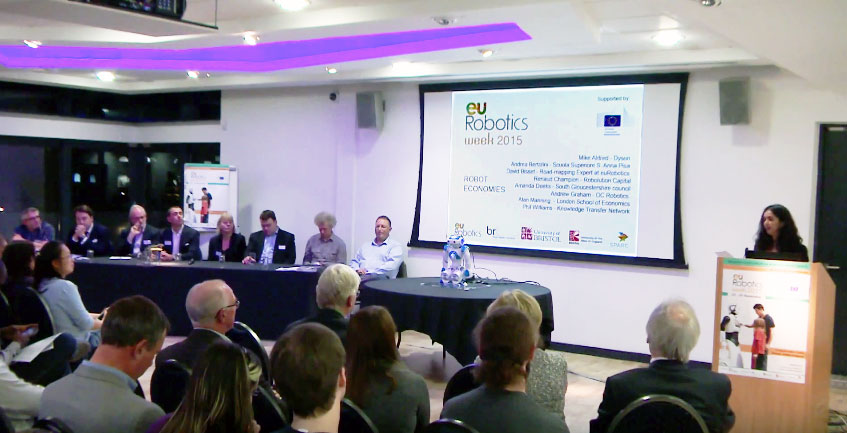
Robohub.org
Major debate on robots & society sets scene for #ERW2015 European Robotics Week

“Robots and Society” panel discussion during European Robotics Week 2015. #ERW2015
A mouthwatering array of over 750 events has been taking place throughout Europe this week as the continent celebrates Robotics Week 2015. The festivities began with an eye-opening debate on “Robots and Society” in the UK city of Bristol on Tuesday, with experts versed in strategy, business, academia, law and policy. But, for many, the star of the show was Nao, in his guise as robot avatar.
The event was organised by euRobotics AISBL, which represents robotics stakeholders in Europe, and by Bristol Robotics Laboratory (BRL), one of the largest facilities of its kind in Europe. “We’re moving into a future where devices that interact with us are going to be part of our everyday experience,” said BRL’s director, Chris Melhuish, setting the scene.
The concern in Europe is that the continent should remain the number one robotics producer worldwide, said politician Mady Delvaux, who heads a European working group on robotics working on concrete proposals to steer European Union policy. The group is expected to issue a report in May next year.
But for the technology to reach its full potential, she told the audience, public acceptance and education are key. Investment is necessary to achieve these aims and encourage innovation in the region, she said, noting that EU nations benefit from SPARC, the largest civilian robotics programme in the world.
Delvaux was followed by a taste of what’s to come in the future: robot avatars. Part of an Engineering and Physical Sciences Research Council (EPSRC) project, Being There focuses on robots and humans in public spaces. The project team is led by BRL’s Paul Bremner who, at a recent TEDx, presented the first talk using a tele-operated humanoid robot that replicates the movements of its human operator, showcasing the benefits of robotic avatars. The Bristol audience was able to see the experiment replicated with Nao.
Then came the main business of the evening — two panel discussions focussing on aspects underpinning the role of robots in society, the first focussing on economic considerations and the second on ethical implications.
Economics — The first panel featured Mike Aldred of Dyson’s Robotics unit, local council leader Amanda Deeks, London School of Economics professor Alan Manning, euRobotics road-mapping expert David Bisset, Phil Williams of the UK’s Knowledge Transfer Network, robolaw expert Andrea Bertolini, Technical Director of OC Robotics Andrew Graham, and Renaud Champion of Robolution Capital.
To put the enabling potential of robotic technologies into perspective, Amanda Deeks provided the audience with some eye-opening statistics. Over 60% of council work is in social care, she said, and as people live longer they need more and more help. The vast majority of adults live out a substantial part of their lives with some sort of disability. In the case of women, that’s an average of 18 years. For men, it’s 14 years, but only because they die earlier.
The KTN’s Phil Williams added some further figures to the mix, showing how much value many estimates placed on the robotics market: ranging from 15.5 billion euros to $25 billion, the widely differing figures had only one thing in common: they were huge. The question, as he sees it, is: why is the UK not taking more advantage of this?
Although the benefits of robotic technologies are demonstrable, the panel was keen to deal with the thorny question of robots replacing human jobs. In response to scaremongering reports, the LSE’s Alan Manning pointed out that, historically, everybody has ultimately benefited from past technological advances.
Issues of privacy (when it comes to data) and public perception were also touched on by the panel, particularly self-driving cars — a technological advance the UK is particularly keen to get behind. However, a recent survey by the UK’s Transport Systems Catapult, suggests that only 39% of UK citizens would allow themselves to be driven by an autonomous vehicle. The audience show of hands was roughly in accordance with this figure.
As with much else, the answer to this, in David Bisset’s opinion, is education. “Robots in research labs need to get out,” he said. “The problem with that is regulation and testing them. There are a stream of regulatory and ethical issues.”
Ethics — Ethical issues were at the heart of the second panel discussion, together with education. The panel featured robot ethics research specialists Alan Winfield of BRL and Fiorella Operto of the Genoa’s School of Robotics in Italy, as well as lawyer Andrea Bertolini of the Scuola Superiore, S. Anna in Pisa, Italy, Nikos Pronios from Innovate UK and David Bisset who was also on the prior panel.
Trust issues are at the core of the importance of robot ethics, said Alan Winfield. We have to define what kind of robot we don’t want in our lives. It’s also the start of the legislative process. It begins with ethics, which develop into standards and continue through to legislation. He urged the audience to look at BS8611 — the world’s first standard on robot ethics.
However, robots cannot be more ethical than humans. The ethics have to be predetermined by us and there has to collaboration with lawyers and ethicists, he said.
The panel were in accord that there will undoubtedly eventually be an accident with an autonomous vehicle or other robot, and the idea of a trusted robot commission that investigates accidents was put forward. Only through having a transparent process will we overcome the trauma of that first accident.
The importance of design in terms of interaction, to facilitate the right interfaces and experiences, was pointed out by David Bisset, who also advocated for lifelong education. “To be trained for second career in midlife needs to be a right,” he said. “There needs to be a sea change.”
EuRobotics acting President Uwe Haass provided further evidence for this. He told the audience about a scheme for giving educational robot kits to 45-year-old women returning to work after having had their children. It was very effective in helping these women develop a great sense of esteem, he said.
But learning about robots also holds great benefits early on in life, said Fiorello Operto. “Education in robotics is the best way to teach STEM.”
The audience had a great many questions, for instance: should you develop a robot that decides its own ethics? The panel was doubtful that this was advisable, or even likely, but it should be a public decision in any case. In a similar vein, another member of the audience wanted to know whether we should be able to design the ethics of our own car.
At this point the debate turned to data and privacy considerations that are likely to become commonplace with self driving vehicles. Putting this into perspective, David Bisset said that he believed that the larger ethical problems will arise from the data accruing from elderly care robots rather than from cars.
Echoing an earlier statement from Mike Aldred that the real benefit comes when things join up. “In robotics,” said Bisset, “ethics, law, engineering and design all need to interact together.”
tags: c-Events, Design, engineering, ERW2015, ethics, EU, euRobotics, European Robotics Week, humanoid, law, UK




